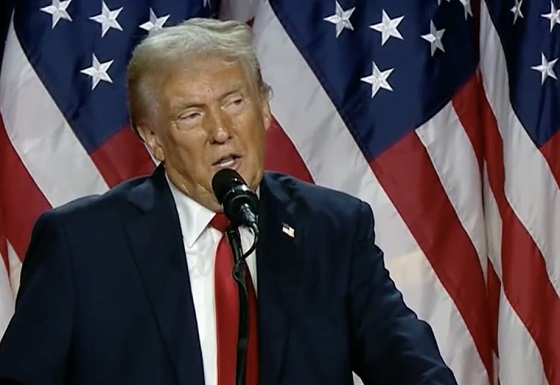From The Center Square
By Casey Harper and Dan McCaleb
Trump to become 47th U.S. president after being 45th
Former President Donald Trump addressed a raucous crowd of his supporters in Palm Beach, Florida, early Wednesday to declare victory in both the Electoral College and the popular vote in the 2024 presidential race.
It became official later in the morning with several media outlets declaring Trump the president-elect after calling races in Pennsylvania and Wisconsin for the former president.
At 5:30 a.m., NBC News joined Fox News in calling Wisconsin for Trump, pushing his electoral vote total to 277, above the 270 needed to win the presidency. Trump joins Grover Cleveland as the only U.S. presidents to serve two non-consecutive terms.
Nearly two hours earlier, however, Trump had declared victory.
“Frankly, I believe this was the greatest political movement of all time, and maybe beyond,” Trump said to begin his remarks before going on to promise to “help our country heal.”
“I want to thank the American people for the extraordinary honor of being reelected your 47th president, and your 45th president,” Trump said.
“This will truly be the golden age of America,” he continued.
In a stunning comeback, the former president won after surviving two assassination attempts and as he faced four separate criminal prosecutions that were launched after he left the White House in 2021.
The 78-year-old Trump led the popular vote by about 5 million votes when he gave his victory speech and held that lead by 6 a.m. He becomes the first Republican to win the popular vote since George W. Bush in 2004.
Several media outlets named Trump the winner of the swing states of North Carolina, Georgia and Pennsylvania, key states that propelled him toward victory.
As results continued to trickle in early Wednesday, Trump maintained leads in the other swing states of Michigan, Arizona and Nevada.
Fox News called the race in Wisconsin and declared Trump the winner of the race before his speech, while other outlets kept Trump just a few electoral votes short of the needed 270.
Trump also continues to hold leads in swing states Michigan, 52.5% to 45.8% with 73% of returns reported; in Arizona, 50.4% to 48.8% with 52% of votes counted; and in Nevada, 51.6% to 46.7% with 81% in.
During his victory speech, Trump called up his vice presidential pick, U.S. Sen. J.D. Vance, R-Ohio, and thanked him.
“I think that we just witnessed the greatest political comeback in the history of the United States of America,” Vance told the crowd.
Cedric Richmond, co-chairman of the Harris campaign, addressed supporters earlier Wednesday, saying there were still plenty of votes to be counted. He also said Harris would not be making a statement until later in the day Wednesday.
Real Clear Politics’ polling average going into Election Day showed very narrow leads for Trump in Arizona, Georgia, Nevada, North Carolina, and Pennsylvania. However, the polling average showed Trump behind by half a point in Michigan and Wisconsin. All the swing states appeared to be going for Trump as the sun began to rise on the east coast Wednesday.
Results began to trickle in after 6 p.m. EST, picking up steam throughout the night.
Trump quickly took a lead, ahead of Harris roughly 105 to 72 votes just after 8 p.m. Eastern time.
The lead continued to grow until after 1 a.m., when media outlets began calling Pennsylvania for Trump, ending Harris’ only remaining path to the White House.
Multiple media outlets also reported Republicans won control of the U.S. Senate, but control of the House remains to be determined as the votes are counted.
“It also looks like we’ll be keeping the House of Representatives,” Trump said, referring to the latest data trending in Republicans’ favor.
Former President Barack Obama warned Americans on Tuesday the results of the election may take several days to come in, but Trump’s win was swifter than most predicted.
“Many have told me that God spared my life for a reason,” Trump said, referencing his surviving two assassination attempts, the first when he was grazed in his ear at a campaign rally in Butler, Pa., the second when a would-be assassin built a sniper’s nest near one of his West Palm Beach golf course as he was playing. “And that reason was to save our country and restore our country together, and we are going to fulfill that mission.”
Several media outlets called Alabama, Arkansas, Idaho, Indiana, Kansas, Kentucky, Louisiana, Mississippi, Missouri, Montana, North Dakota, Ohio, Oklahoma, South Carolina, South Dakota, Tennessee, Utah, West Virginia and Wyoming for Trump.
And several media outlets called California, Colorado, Connecticut, Delaware, Hawaii, Illinois, Maryland, Massachusetts, New Jersey, New York, Oregon, Rhode Island, Vermont, and Washington and Washington D.C. for Harris.

















